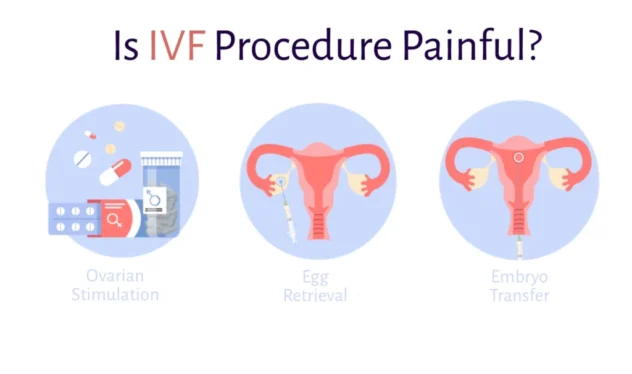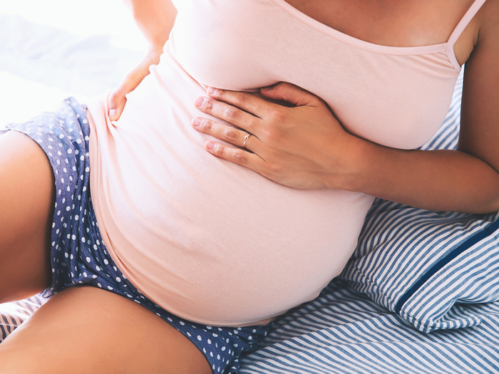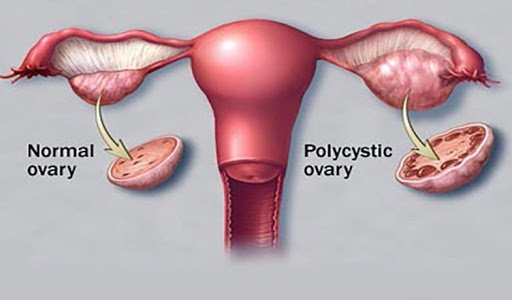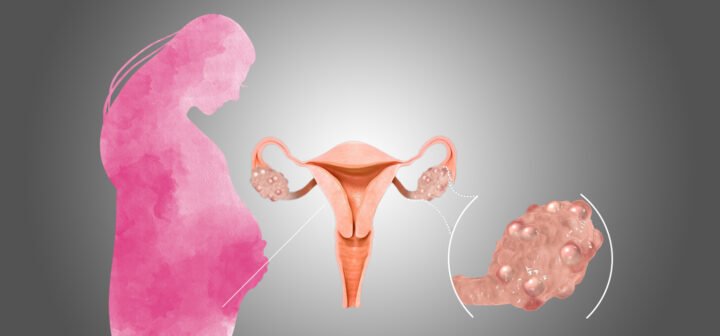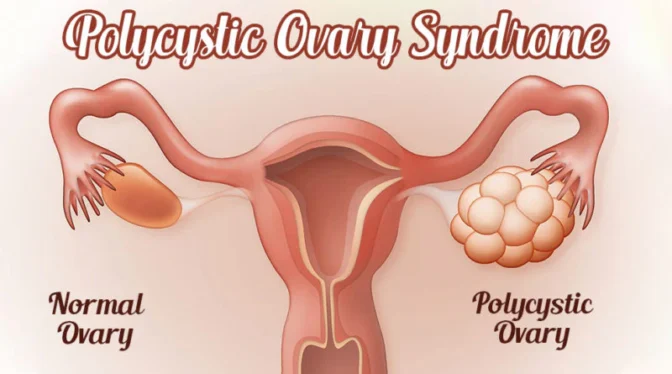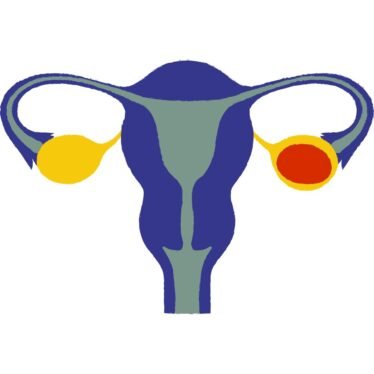How Sleep Disorders Affect Women with PCOS
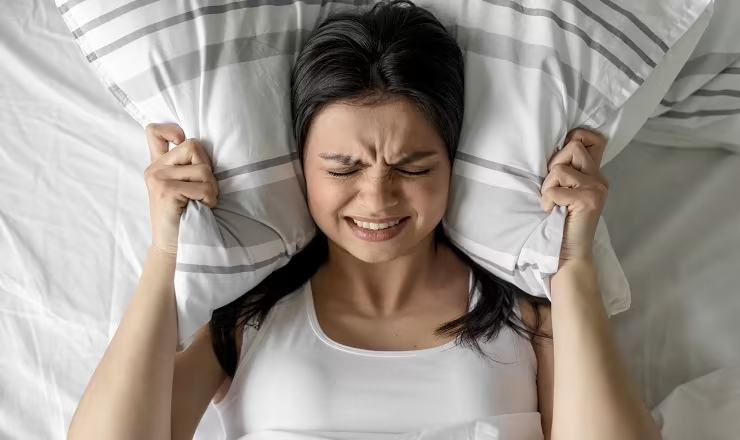
Polycystic Ovary Syndrome (PCOS) Is A Common Health Condition That Affects Millions Of Women Around The World. It Can Cause A Range Of Symptoms, From Irregular Periods And Weight Gain To Acne And Fertility Issues. But One Important Part Of PCOS That Often Gets Overlooked Is How It Affects Sleep. If You’re A Woman Living With PCOS And You Struggle To Fall Asleep, Stay Asleep, Or Wake Up Feeling Tired, You’re Not Alone. Sleep Problems Are Very Common In Women With PCOS And They Can Make Your Sleep Disorder Symptoms Even Worse.
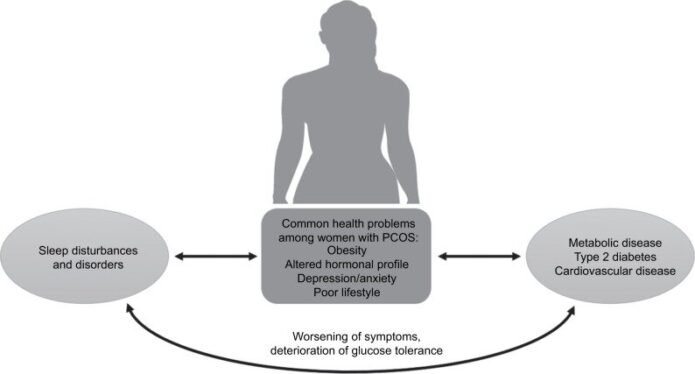
In This Blog, We’ll Break Down How PCOS And Sleep Are Connected, The Types Of Sleep Disorders That Are More Common In Women With PCOS, And What You Can Do To Improve Your Sleep And Overall Health.
This Blog Will Help You Understand The Sleep Disorder Symptoms Associated With PCOS And Provide Insights On Managing Them Effectively.
The Link Between PCOS And Sleep
PCOS Is A Hormonal Condition That Affects The Way Your Ovaries Work. It’s Caused By An Imbalance In Reproductive Hormones Like Estrogen, Progesterone, And Androgens (Like Testosterone). This Imbalance Can Lead To Issues Like:
Irregular Or Missed Periods
Difficulty Getting Pregnant
Weight Gain Or Trouble Losing Weight
Excess Facial Or Body Hair
Acne Or Oily Skin
Mood Changes
But Here’s Something Many People Don’t Know: Those Same Hormonal Imbalances Can Affect Your Sleep. Women With PCOS Often Have Higher Levels Of Insulin (A Hormone That Controls Blood Sugar), And Many Also Have Higher Levels Of Testosterone. Both Of These Can Interfere With Your Body’s Natural Sleep-Wake Cycle, Also Known As Your Circadian Rhythm.
Common Sleep Disorders In Women With PCOS
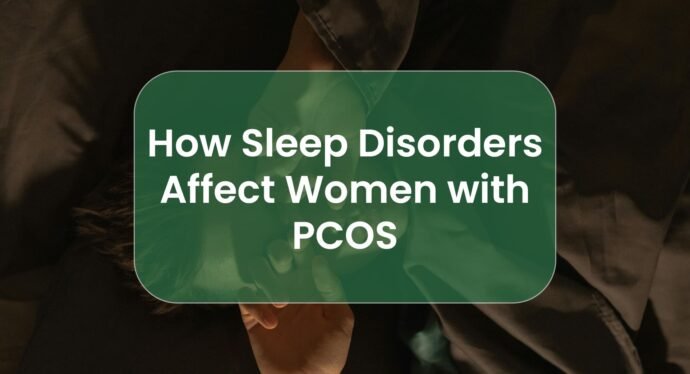
There Are A Few Specific Sleep Disorders That Are More Common In Women Who Have PCOS:
1. Obstructive Sleep Apnea (OSA)
This Is One Of The Most Common Sleep Problems In PCOS. Sleep Apnea Is A Condition Where Your Breathing Repeatedly Stops And Starts During Sleep. It’s Often Linked To Being Overweight, Which Is Common In Women With PCOS Due To Insulin Resistance.
When You Have Sleep Apnea, You Might:
Snore Loudly
Wake Up Gasping For Air
Feel Very Tired During The Day
Have Morning Headaches
Struggle With Focus Or Memory
Understanding Sleep Disorder Symptoms In PCOS
Sleep Apnea Can Be Serious. It Increases Your Risk Of High Blood Pressure, Heart Disease, And Type 2 Diabetes Conditions That Women With PCOS Are Already More Likely To Develop.
2. Insomnia
Insomnia Means Having Trouble Falling Asleep Or Staying Asleep. Many Women With PCOS Report Feeling “Wired But Tired” — Exhausted, But Unable To Sleep. This May Be Caused By:
Hormonal Imbalances
Anxiety Or Depression (Which Are More Common In PCOS)
Blood Sugar Fluctuations
High Levels Of Cortisol, The Stress Hormone
Even Just A Few Nights Of Poor Sleep Can Worsen PCOS Symptoms. It Can Lead To Cravings For Sugar, Increased Appetite, And Even More Hormone Imbalance.
3. Restless Legs Syndrome (RLS)
Some Women With PCOS Also Report Restless Legs Syndrome, A Condition That Causes An Uncontrollable Urge To Move Your Legs, Especially At Night. This Can Make It Difficult To Fall Asleep Or Stay Asleep.
Low Levels Of Iron (Ferritin), Which Are More Common In Women With Heavy Or Irregular Periods, May Play A Role In RLS.
How Poor Sleep Makes PCOS Worse
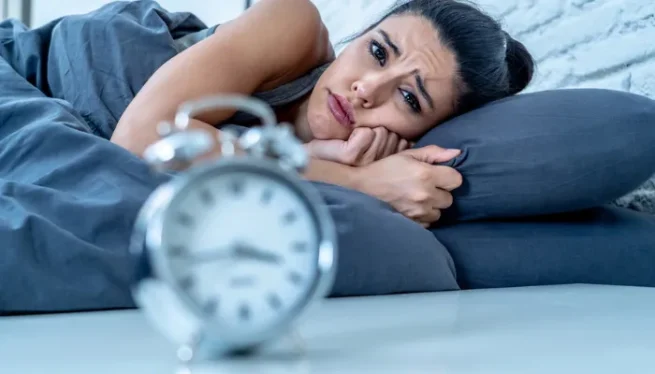
Bad Sleep Doesn’t Just Make You Tired, It Can Have A Big Impact On Your Hormones, Mood, Metabolism, And Overall Health. For Women With PCOS, Poor Sleep Can:
1. Increase Insulin Resistance
When You Don’t Sleep Well, Your Body Becomes Less Sensitive To Insulin. This Means Your Blood Sugar Levels Go Up, And Your Body Produces More Insulin To Compensate. Over Time, This Can Lead To Type 2 Diabetes.
Insulin Resistance Also Makes It Harder To Lose Weight — A Common Struggle For Women With PCOS.
2. Raise Cortisol Levels
Poor Sleep Raises Your Cortisol Levels (Your Stress Hormone). High Cortisol Can:
Increase Belly Fat
Disrupt Ovulation
Trigger Sugar Cravings
Affect Your Mood
For Women With PCOS, Managing Cortisol Is Important To Help Balance Other Hormones Too.
3. Affect Fertility
Lack Of Good Sleep Can Throw Off Your Menstrual Cycle, Affect Ovulation, And Reduce Your Chances Of Getting Pregnant. If You’re Trying To Conceive, Improving Your Sleep Could Be A Powerful Step.
4. Worsen Mood And Mental Health
Anxiety And Depression Are More Common In Women With PCOS — And Poor Sleep Only Makes Them Worse. When You’re Not Sleeping Well, Your Brain Has A Harder Time Managing Emotions And Stress.
Signs You Might Have A Sleep Disorder
You Might Have A Sleep Issue If You:
Snore Or Stop Breathing During Sleep
Wake Up Feeling Tired Even After 7–8 Hours
Struggle To Fall Asleep Or Stay Asleep
Feel Sleepy Or Irritable During The Day
Have Trouble Focusing Or Remembering Things
Wake Up With Headaches
If Any Of These Sound Familiar, It’s Worth Speaking With Your Doctor.
Tips For Better Sleep With PCOS

Here Are Some Simple, Practical Steps That Can Help You Sleep Better — And Feel Better Overall:
1. Stick To A Sleep Schedule
Go To Bed And Wake Up At The Same Time Every Day, Even On Weekends. This Helps Regulate Your Body’s Clock.
2. Limit Screen Time Before Bed
The Blue Light From Phones And TVs Can Mess With Your Melatonin (The Sleep Hormone). Try Turning Off Screens At Least An Hour Before Bed.
3. Create A Relaxing Night Routine
Read A Book, Take A Warm Bath, Stretch Gently, Or Try Deep Breathing To Help Your Body Wind Down.
4. Avoid Heavy Meals Late At Night
Eating Too Close To Bedtime Can Raise Blood Sugar And Insulin, Making It Harder To Fall Asleep.
5. Exercise Regularly
Even A 20–30 Minute Walk Each Day Can Improve Sleep, Balance Hormones, And Boost Mood. Just Try Not To Exercise Too Close To Bedtime.
6. Limit Caffeine And Sugar
These Can Both Disrupt Sleep, Especially If Consumed In The Afternoon Or Evening.
7. Talk To A Doctor Or Sleep Specialist
If You Think You Might Have Sleep Apnea Or Another Sleep Disorder, A Sleep Study Could Help Diagnose The Problem. There Are Treatments That Can Make A Big Difference Or Else You Can Book Consultation With Us By Visiting Our Websiite www.brosisherbal.com
Conclusion
Sleep And PCOS Are Deeply Connected And Improving Your Sleep Can Be A Powerful Step Toward Feeling Better, Balancing Hormones, And Managing Symptoms. If You’re Living With PCOS And Struggling With Sleep, Know That You’re Not Alone, And There Are Steps You Can Take. Talk To Your Doctor, Listen To Your Body, And Give Yourself The Care And Rest You Deserve.
Better Sleep = Better Health

